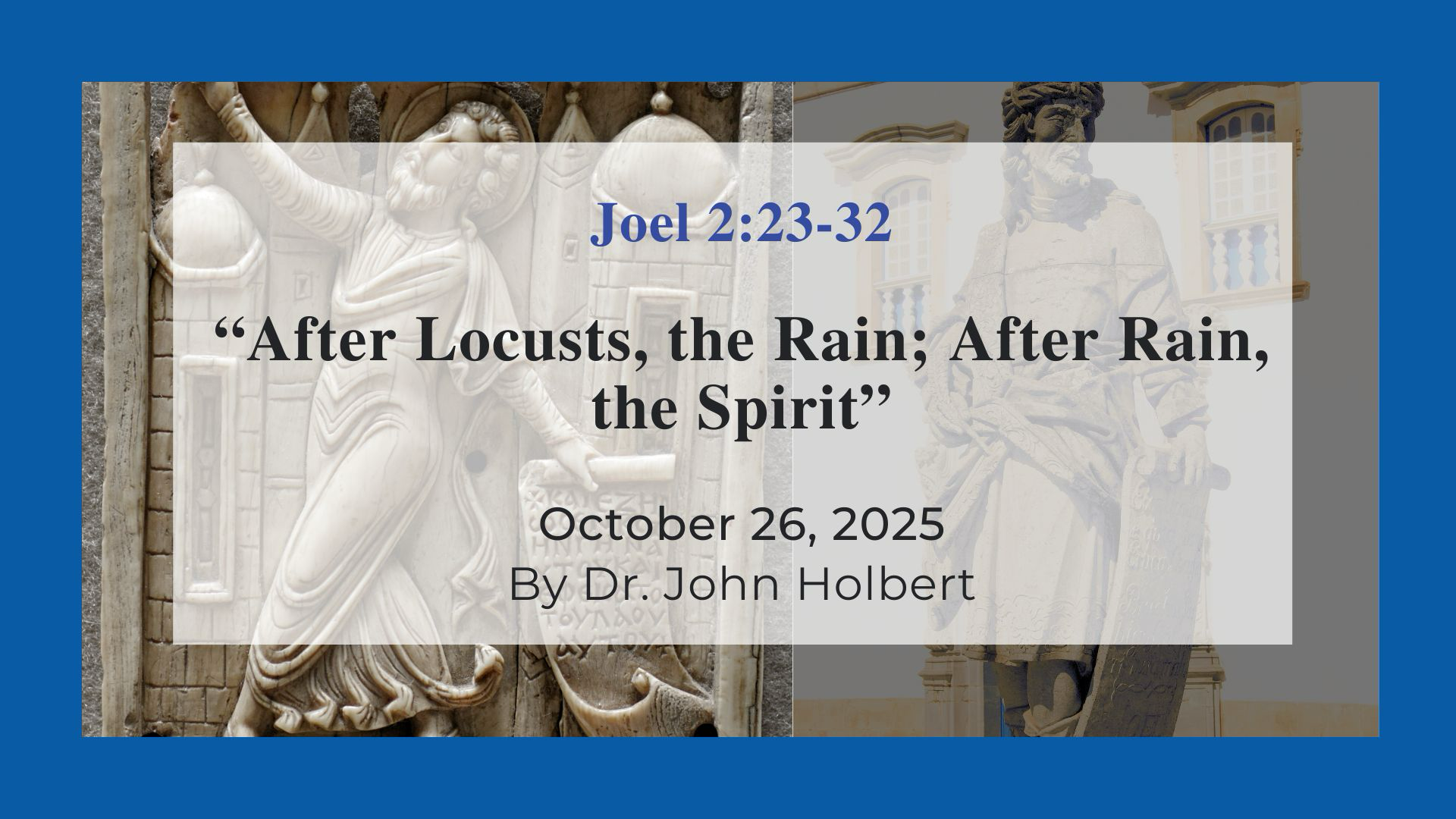After Locusts, the Rain; After Rain, the Spirit - Reflections on Joel 2:23-32, Pentecost 20, Year C
by John C. Holbert on Tuesday, June 24, 2025

The enigmatic tiny book of Joel rarely makes its appearance in any lectionary, but due to its use in the famous Pentecost sermon of Peter, it does rise there (when Gen.11 does not usurp its place) and at other random times. Here in the 20th Sunday after Pentecost is one of those times. Our reading of Joel depends first on the understanding of a plague of locusts. Locusts are grasshoppers on steroids, swarming in infestations nearly legendary in historical records. To this day, scientists are not completely certain why this phenomenon occurs.
One account of such a plague in 1915 in Palestine was recorded by a German witness, Ludwig Bauer. Swarms of the insects, he says, flew overhead for five days, completely darkening the skies. While this was happening, the bugs mated, and each female deposited 50-80 eggs, mainly in uncultivated ground at a depth of 2-3 inches. After 30-40 days, young locusts, about one centimeter long, began to hatch. Within 5-6 weeks, they had grown to 2-3 inches, passing through four distinct morphological changes: first pale yellow, with their offspring at first black. They then shed their exoskeletons and emerge green-yellow, with black and white dots and stripes. They then change again, becoming red with black color in their new wings. Little can stop the literal millions of them once they emerge, especially in uncultivated ground, and once they find new crops of whatever sort they will devour nearly everything in their path. Little wonder that the prophet Joel found in such a plague a metaphor for the actions of YHWH through military power. I suggest that Joel’s personal experience of a locust infestation brought to his mind the unstoppable power of YHWH.
However, Joel’s imagination does not stop there. He continues by saying the locust plague is hardly YHWH’s final word against the land and against Israel. In the face of the plague, Israel is called to repentance (Joel 1:15-17), and YHWH hears their genuine cry and responds with abundance, beginning with showers of rain (Joel 2:23) which leads to “threshing floors full of grain, and vats overflowing with wine and oil” (Joel 2:24). I suggest that Joel 2:25 may indicate Joel’s careful observation of the locusts that constituted the infestation he witnessed. As I noted above, the locusts undergo several physical alterations during the period of their swarming. He employs three different words to describe the insects, translated by the NRSV as “hopper, destroyer, and cutter.” These Hebrew words are not easy to differentiate, but may suggest the changing roles of the locusts as they undergo the changes I described. Joel 2:26-27 conclude the portraits of the great plenty that YHWH will provide a renewed Israel after the locusts have vanished.
“You shall eat plentifully and be satiated,
and shall praise the name of YHWH, your God,
who has dealt with you with wonders.
My people shall never again be put to shame!
You shall know that I am in the midst of Israel, even I,
and that I, YHWH, am your God; there is no other.
My people shall never again be put to shame!”
After that joyous hymn, Joel adds the lines made famous in Peter’s Pentecost sermon. They are in fact in Hebrew Joel 3:1-2, suggesting that they are in reality the beginning of another, though related, idea.
“After that, I will pour out my spirit on all flesh;
your sins and your daughters will prophesy,
your old men shall dream dreams,
your young boys will see visions.
Even on male and female slaves,
in those days I will pour out my spirit.”
In short, says Joel, the spirit of YHWH, often seen as confined to the prophets or to people uniquely set aside for religious work, will one day be found everywhere available and active, among men and women, among young and old, among male and female slaves. It is a wonderful vision of a time when all can receive the special call of YHWH to service, not limited by gender, age, or societal location. Little wonder that Luke picks up the idea in Peter’s sermon in Acts 2, a visible sign of God’s spirit set free on all assembled that day, where 3000 were included in the emerging new Christian community.
We cannot know when Joel wrote these lines, though many imagine them as having been produced post-exilically. Whenever they were composed, the movement from locusts to rain to plenty to the universal access to the spirit of YHWH, presents to us nothing less than the movement from God’s judgement to God’s will for universal mercy for all in this and every time. Indeed, such beautiful divine progress fairly begs to be proclaimed far and wide!
